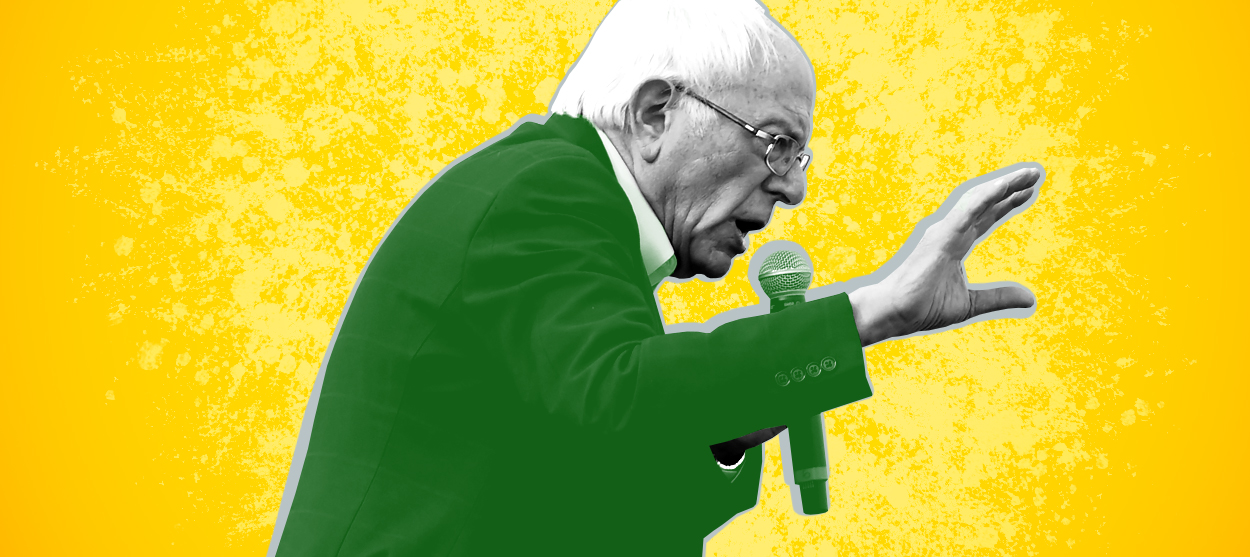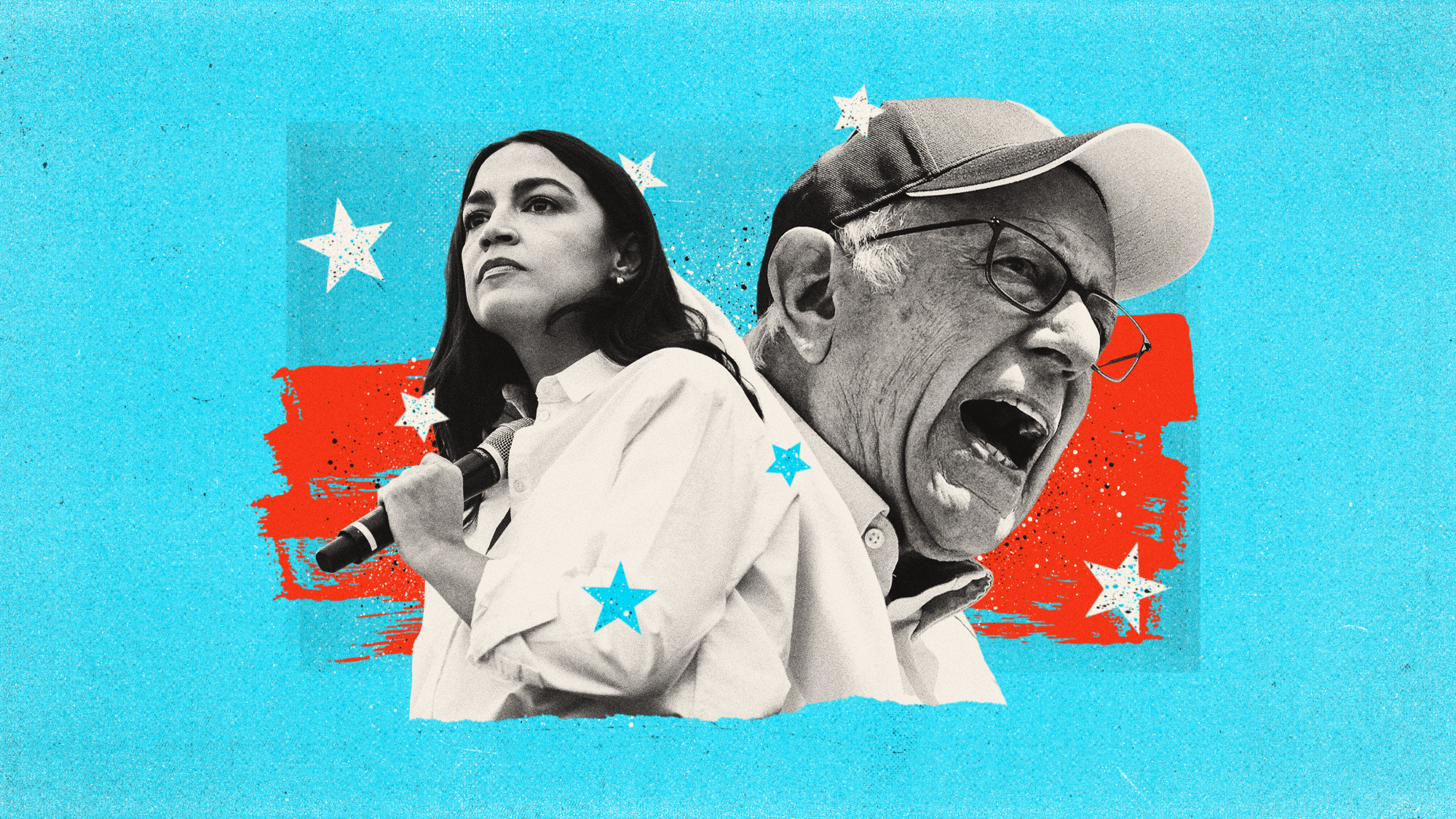Why this libertarian hopes Bernie Sanders wins
We disagree on just about everything. But in some key areas he's as close as I'll get.


A free daily email with the biggest news stories of the day – and the best features from TheWeek.com
You are now subscribed
Your newsletter sign-up was successful
Anything close to my politics and a plausible shot at the American presidency will never coincide in the same person. That is true in this election; it has been true of all elections in my lifetime; and I expect it to be true of all elections in my years to come. As my colleague Damon Linker has explained analyzing data from the 2016 cycle, the libertarian quadrant in American politics is increasingly empty. Authoritarianism is on the rise and there is little in the way of a principled anti-war movement in America. Our presidential options reflect these trends.
The effect, for me, is a sort of detachment from electoral spectacle. It isn't that I don't care about the outcome. I do. But there's a reason people bet at the track: It's just different when you have no horse in the race. Whether I'll vote in the general election this year remains to be seen — usually I'm drawn out by ballot questions or offices like district attorney — but if I make it to Minnesota's open Democratic primary on Super Tuesday (the GOP primary is functionally canceled), I'll vote for Bernie Sanders.
The socialist senator from Vermont, who in CNN's latest poll is the national front-runner, might seem like an odd choice for a libertarian like me. If by some strange arithmetic we averaged out the leading Democrats' campaign platforms, I'd probably land closer to a moderate like my own senator, Amy Klobuchar. Her decision to claim the budget hawk lane of the primary has caught libertarian notice, mine included, though I haven't forgiven her pandering betrayal of our state fair. In The Washington Post's frankly awful candidate match quiz — which somehow judged it fit to include a question about court-packing while ignoring our half-dozen ongoing wars entirely — I was paired with former New York City Mayor Michael Bloomberg. Bloomberg!
The Week
Escape your echo chamber. Get the facts behind the news, plus analysis from multiple perspectives.

Sign up for The Week's Free Newsletters
From our morning news briefing to a weekly Good News Newsletter, get the best of The Week delivered directly to your inbox.
From our morning news briefing to a weekly Good News Newsletter, get the best of The Week delivered directly to your inbox.
After its bizarre selection of topics, the biggest flaw in the Post's quiz was its assignment of equal weight to issues of widely disparate relevance. Restoring felons' voting rights is an important subject, for example, but it is also wholly outside the president's legal purview. (The choice belongs to the states; it would matter much more in a gubernatorial race.) Thus while it's true that centrists like Klobuchar might well fall closer to me on a political map plotted with a comprehensive, leveled tally of our views, I'm not equitably considering all our views when I make this choice.
No viable Democratic candidate will share my ideas on economics, health care, education, or abortion. That's a given and, in the primaries, removes these topics from my calculation. The first two also happen to be areas where I'm most pessimistic about my preferences becoming fact. I can't imagine a scenario in which Washington becomes fiscally continent, and I'm fairly sure Medicare-for-all is a fait accompli.
Foreign policy is where there's a more meaningful diversity among the candidates as well as a small but real chance for change. That's where Sanders gets me, especially because the president has unilateral power to end our endless wars. (The Constitution limits executive authority to start wars but not to make peace.)
To be fair, I've criticized Sanders for being insufficiently anti-war in the past, and I reiterate those objections: If elected, he says he would retain the drone warfare program (though he has since emphasized intent to curtail its use). He voted in favor of 2016 rival Hillary Clinton's pet intervention in Libya, in favor of the interminable war in Afghanistan, and even in favor of multiple funding measures to maintain the war in Iraq — a repeated "yes" to bankrolling the very conflict he so often boasts of opposing. Moreover, Sanders and I do not come by our opposition to military interventionism the same way — his is partly informed by sympathies for communist regimes like Cuba's, which I deplore — and he sees a vindication in coalition-backed wars which I do not.
A free daily email with the biggest news stories of the day – and the best features from TheWeek.com
And yet, compared to the other leading Democrats (and certainly compared to President Trump, who has embraced the Mr. Hyde side of his discordant foreign policy instincts and jettisoned the Dr. Jekyll), Sanders stands out. He is miles better on questions of war and diplomacy than former Vice President Joe Biden, who shows every inclination to continue the bipartisan, interventionist status quo of post-9/11 Washington, as do Klobuchar, Bloomberg, and South Bend Mayor Pete Buttigieg.
Sanders also has an edge on Sen. Elizabeth Warren (D-Mass.), who usually rounds out the top three in national surveys. The divide here is narrower. Both Sanders and Warren, as the Brookings Institute's Thomas Wright chronicles at The Atlantic, want to end U.S. military intervention in Afghanistan, Iraq, Syria, and Yemen. Both support the Iran deal, question U.S. relations with Saudi Arabia and the scope and aims of the war on terror, and want to significantly trim Pentagon spending.
But there are differences. In a piece for Foreign Affairs, Warren described diplomacy as an accessory that "amplifie[s]" "strong yet pragmatic security policies." Sanders' essay there speaks of "privilege[ing] diplomacy" and rejecting militarism. Asked in an interview with the Council on Foreign Relations about the greatest foreign policy mistake since World War II, Warren spoke vaguely about failing to strengthen working families. Posed the same question, Sanders went straight to the war in Iraq. Maybe most importantly, Warren wants to "preserv[e] the United States' global leadership role" — too often a gateway phrase to interventionism, however reluctant — while Sanders is willing for the U.S. to drop its claim to indispensability and the world policing it has entailed.
Of course, the last three presidents we elected all campaigned with promises of more restraint in foreign affairs, and look how that turned out. Wright's analysis makes a compelling case that Warren or even Sanders will follow the same path if elected, pursuing foreign policies much less radical than their rhetoric suggests. He may be right, and regardless, Sanders is far from perfect, in my view. But if I do cast a primary vote, he'll be my "from-across-the-horseshoe" choice.
Want more essential commentary and analysis like this delivered straight to your inbox? Sign up for The Week's "Today's best articles" newsletter here.
Bonnie Kristian was a deputy editor and acting editor-in-chief of TheWeek.com. She is a columnist at Christianity Today and author of Untrustworthy: The Knowledge Crisis Breaking Our Brains, Polluting Our Politics, and Corrupting Christian Community (forthcoming 2022) and A Flexible Faith: Rethinking What It Means to Follow Jesus Today (2018). Her writing has also appeared at Time Magazine, CNN, USA Today, Newsweek, the Los Angeles Times, and The American Conservative, among other outlets.
-
 Quentin Deranque: a student’s death energizes the French far right
Quentin Deranque: a student’s death energizes the French far rightIN THE SPOTLIGHT Reactions to the violent killing of an ultra-conservative activist offer a glimpse at the culture wars roiling France ahead of next year’s elections.
-
 Secured vs. unsecured loans: how do they differ and which is better?
Secured vs. unsecured loans: how do they differ and which is better?the explainer They are distinguished by the level of risk and the inclusion of collateral
-
 ‘States that set ambitious climate targets are already feeling the tension’
‘States that set ambitious climate targets are already feeling the tension’Instant Opinion Opinion, comment and editorials of the day
-
 The billionaires’ wealth tax: a catastrophe for California?
The billionaires’ wealth tax: a catastrophe for California?Talking Point Peter Thiel and Larry Page preparing to change state residency
-
 Mamdani vows big changes as New York’s new mayor
Mamdani vows big changes as New York’s new mayorSpeed Read
-
 Bari Weiss’ ‘60 Minutes’ scandal is about more than one report
Bari Weiss’ ‘60 Minutes’ scandal is about more than one reportIN THE SPOTLIGHT By blocking an approved segment on a controversial prison holding US deportees in El Salvador, the editor-in-chief of CBS News has become the main story
-
 Has Zohran Mamdani shown the Democrats how to win again?
Has Zohran Mamdani shown the Democrats how to win again?Today’s Big Question New York City mayoral election touted as victory for left-wing populists but moderate centrist wins elsewhere present more complex path for Democratic Party
-
 Millions turn out for anti-Trump ‘No Kings’ rallies
Millions turn out for anti-Trump ‘No Kings’ ralliesSpeed Read An estimated 7 million people participated, 2 million more than at the first ‘No Kings’ protest in June
-
 Ghislaine Maxwell: angling for a Trump pardon
Ghislaine Maxwell: angling for a Trump pardonTalking Point Convicted sex trafficker's testimony could shed new light on president's links to Jeffrey Epstein
-
 The last words and final moments of 40 presidents
The last words and final moments of 40 presidentsThe Explainer Some are eloquent quotes worthy of the holders of the highest office in the nation, and others... aren't
-
 The anger fueling the Bernie Sanders and Alexandria Ocasio-Cortez barnstorming tour
The anger fueling the Bernie Sanders and Alexandria Ocasio-Cortez barnstorming tourTalking Points The duo is drawing big anti-Trump crowds in red states
